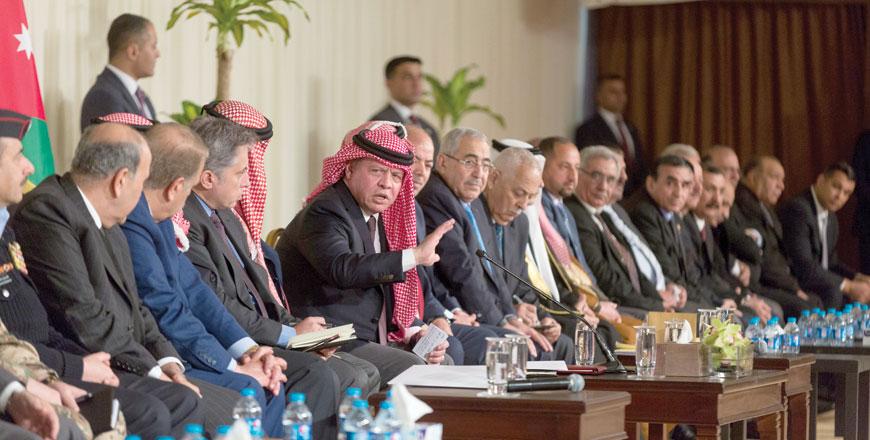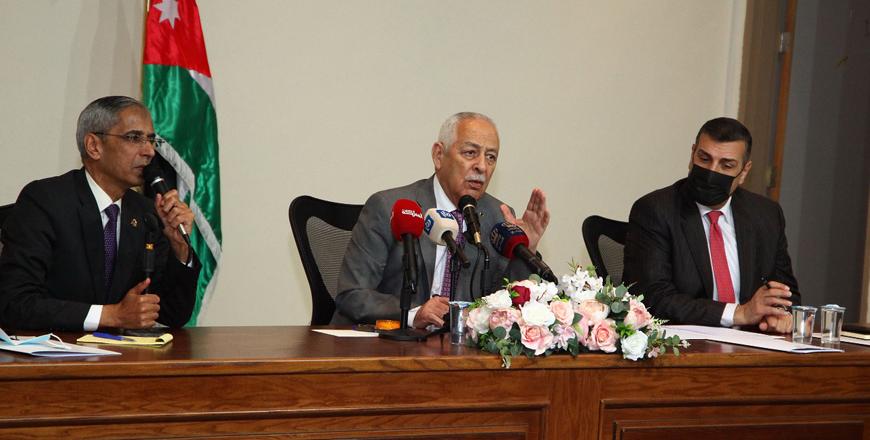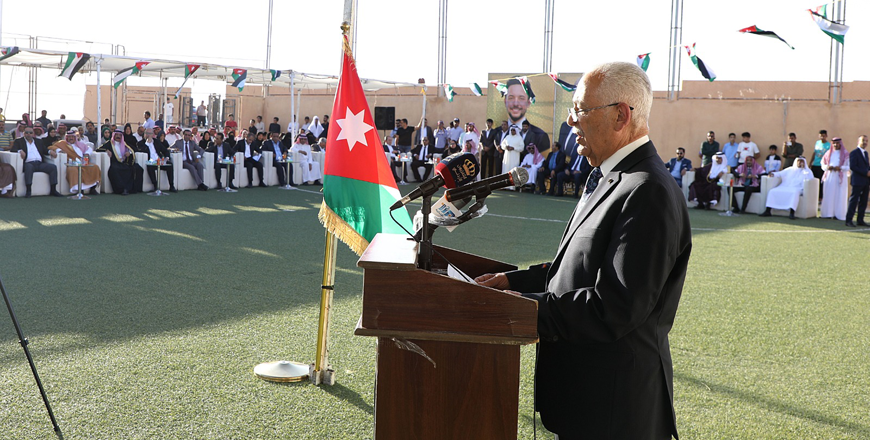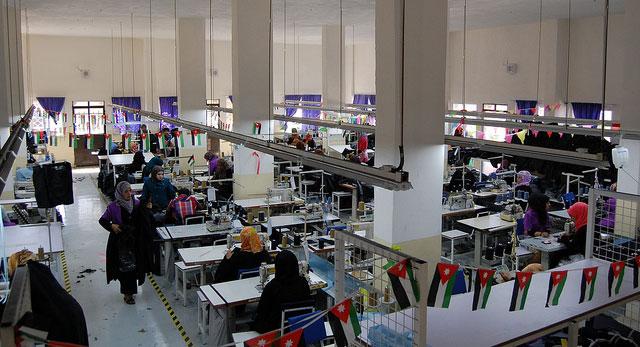You are here
King: ‘Our northern border is secure’
By JT - Feb 11,2016 - Last updated at Feb 11,2016

His Majesty King Abdullah speaks to community leaders and dignitaries from Mafraq Governorate at the Royal Court in Amman on Wednesday (Photo courtesy of Royal Court)
AMMAN — His Majesty King Abdullah on Wednesday asserted that the Kingdom's northern border with Syria is strong and safe, voicing his confidence in the Jordan Armed Forces-Arab Army’s (JAF) ability to protect the country.
“The northern border of the Kingdom is tight and safe, and our Arab Army and security bodies are capable of protecting it," the King said during a meeting with representatives and key figures from Mafraq Governorate at the Royal Court.
The King described the February 4 London donors' conference as a beginning to be built on, stressing the importance of a unified stance to benefit from the outcome of the one-day gathering, during which donors pledged to offer Jordan $2.1 billion in grants over the coming three years among a host of other assistance.
In this context, the King urged all concerned parties to shoulder their responsibilities, according to a Royal Court statement.
His Majesty said that the government, parliamentarians and all officials should join forces to benefit from the outcome of the conference and maximise its benefits for the national economy.
Unless Jordan deals efficiently with the issue, it will waste opportunities at hand, the King said at his meeting with the community leaders of the northeastern governorate.
"We have to work seriously," he said, directing the government to examine steps that need to be taken during the coming months so as to benefit from the positive climate of the donor conference.
King Abdullah also requested lawmakers to take part in this effort.
Noting that the results of the conference were positive, the King highlighted the world’s appreciation of Jordan.
The conference is a beginning and has opened various venues for Jordan in terms of assistance, developing the economy, luring investments and boosting trade from Jordan to Europe, as well as beyond, he noted.
The Monarch underlined that he is aware of the challenges Mafraq is facing and the different burdens its people have been grappling with as a result of hosting Syrian refugees, stressing that Mafraq should be a major recipient of the support the Kingdom will receive.
Accordingly, there is a need for productive projects in different fields that meet the nature and the needs of Mafraq’s people, he noted.
“The biggest problem is the economic situation,” he said, pointing out that Mafraq has paid a heavy price in the past few years, in light of the high influx of Syrian refugees and the crisis in Syria.
Currently, there are around 1.3 million Syrians in the Kingdom, and 10 per cent living in camps, and the remainder living in urban areas. In Mafraq city, Syrians constitute the majority of the population, official figures have shown.
With regard to the issue of providing jobs to Syrian refugees and concerns raised in this regard, the King assured his audience that for each job opportunity created for a Syrian worker, five job opportunities will be created for Jordanians.
At the meeting, the Monarch stressed the importance of increasing investment opportunities and expanding the industrial and trade sectors, with the support of the international community, to enable the country to deal with the economic challenges ahead.
Royal Court Chief Fayez Tarawneh, who was present at the meeting, said the King directed Royal Court officials to implement several initiatives in Mafraq to back the government’s efforts in the desert town, which is the provincial capital of a governorate where around 550,000 people live, including 208,000 Syrian guests, according to the 2015 census.
The initiatives include the building of 26 housing units for underprivileged families and four public parks in different areas of Mafraq, besides an amusement park for children.
Also, they have been entrusted with establishing a branch of Zaha Cultural Centre for Childhood Development, in cooperation with the Planning Ministry, he said.
The Royal initiatives will also work to activate youth centres in the governorate, up to 19 facilities.
In terms of voluntary and social work, the initiatives include supporting 10 charitable societies in different areas in Qasabat Al Mafraq, Tarawneh told the attendees.
The King’s meeting with Mafraq’s representatives is part of his efforts to keep in close contact with citizens in different parts of the country and to learn about their needs, the Royal Court said.
The Mafraq community leaders and dignitaries thanked the King for meeting with them and listening to their concerns, expressing their best wishes on the centennial of the Great Arab Revolt.
In remarks at the meeting, representatives of the northeastern governorate highlighted a number of development and economic issues in need of attention to support Mafraq.
Khaled Eitan, the leader of the Harahsheh tribe, said the people of Mafraq are sharing their limited resources with Syrian refugees, commending the King’s efforts to bring the world’s attention to the impact of the refugee crisis on Jordan.
Eitan also thanked the JAF and security agencies for defending the Kingdom’s borders and safeguarding its security.
He called for drafting laws to regulate tribal traditions such as jalwa, which entails the forced relocation of a clan if one of its members murders someone, in a bid to avoid friction between the victim’s and the killer’s tribes or families if they were living in the same area.
Speakers also commended His Majesty’s efforts to safeguard Islamic and Christian holy sites in Jerusalem and thanked him for supporting young people.
They called for building a cultural centre, a public park and a care centre to house victims of domestic abuse in Mafraq. They also highlighted the need for projects to support young people and enable them to cope with the repercussions of the refugee crisis.
A representative of Mafraq’s youth, Alaa Khataibeh, called for improving agricultural lands, digging artesian wells in the governorate’s east, training and rehabilitating mosque imams, and supporting small enterprises.
Mafraq Mayor Ahmad Hawamdeh stressed the need to construct a new building for the Mafraq education directorate to replace the currently rented one, calling for more investments in the governorate and activating its development zone.
Similarly, Mafraq Chamber of Commerce President Abdullah Shdeifat called for establishing a free zone in the governorate.
Related Articles
AMMAN — In implementation of His Majesty King Abdullah’s directives, Royal Court Chief Yousef Issawi on Thursday announced a pack of Royal d
AMMAN — Royal Court Chief Yousef Issawi on Thursday attended a celebration in Mafraq’s Al Defyanah region, Northern Badia district, marking
AMMAN — As the government vowed to allow Syrian refugees to join the Kingdom's labour market if the world helps with encouraging sufficient














